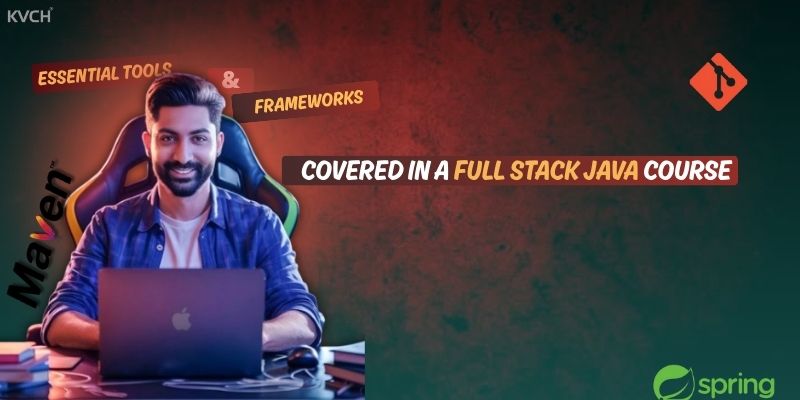In the rapidly evolving world of web development, mastering full stack development is a game-changer for aspiring developers. A Full Stack Java Developer Course equips you with the skills to build robust, scalable, and efficient web applications from front to back. Whether you’re aiming to become a versatile developer or seeking a Java Certification Course to boost your career, understanding the tools and frameworks covered in a Java Full Stack Development Course is critical. This blog dives into the essential components, tools, and frameworks you’ll encounter in a comprehensive Java Full Stack Developer Course, providing a roadmap for success in this dynamic field.
Key Topics in a Full Stack Java Developer Course
A Full Stack Java Developer Course is designed to transform you into a well-rounded developer capable of handling both front-end and back-end development. The curriculum typically spans a wide range of technologies, tools, and frameworks to ensure you can build end-to-end applications. Below, we explore the core areas covered in a Java Full Stack Development Course.
What is a Full Stack Framework?
A full stack framework provides a comprehensive set of tools and libraries to develop both the front-end (user interface) and back-end (server-side logic) of an application. In a Java Full Stack Developer Course, you’ll encounter frameworks that streamline development, enhance scalability, and improve code maintainability.
Spring Framework
The Spring Framework is the cornerstone of back-end development in a Java Certification Course. It simplifies complex tasks like dependency injection, transaction management, and REST API development. Spring Boot, a subset of Spring, is particularly popular for its ability to create production-ready applications with minimal configuration. You’ll learn how to:
- Build microservices with Spring Boot.
- Manage dependencies using Spring’s Inversion of Control (IoC).
- Create RESTful APIs for seamless front-end integration.
Hibernate
Hibernate is an Object-Relational Mapping (ORM) tool that simplifies database interactions in a Java Full Stack Development Course. It allows developers to map Java objects to database tables, reducing boilerplate code. Key topics include:
- Configuring Hibernate for database connectivity.
- Performing CRUD (Create, Read, Update, Delete) operations.
- Managing relationships like one-to-many and many-to-many.
Front-End Frameworks
While Java excels on the back end, a Full Stack Java Developer Course also covers front-end frameworks like Angular, React, or Vue.js. These frameworks help you create dynamic, responsive user interfaces. You’ll learn to:
- Integrate front-end frameworks with Java back ends.
- Use tools like Node.js and npm for front-end development.
- Build single-page applications (SPAs) for a seamless user experience.
Build & Deployment Tools
Building and deploying applications efficiently is a critical skill taught in a Java Full Stack Developer Course. These tools ensure your code is production-ready and scalable.
Maven
Maven is a widely used build automation tool that simplifies dependency management and project builds. In a Java Certification Course, you’ll learn how to:
- Create and manage project dependencies using pom.xml.
- Automate builds and packaging.
- Integrate Maven with CI/CD pipelines.
Gradle
Gradle is another powerful build tool covered in a Java Full Stack Development Course. It offers flexibility and performance advantages over Maven, especially for large projects. You’ll explore:
- Writing build scripts using Groovy or Kotlin.
- Managing multi-module projects.
- Optimizing build performance.
Docker
Containerization is a must-know skill for modern developers. Docker, covered in many Full Stack Java Developer Courses, allows you to package applications and their dependencies into containers. You’ll learn to:
- Create Docker images for Java applications.
- Deploy containers to cloud platforms like AWS or Azure.
- Use Docker Compose for multi-container applications.
Jenkins
Jenkins is a popular CI/CD tool that automates the build, test, and deployment process. In a Java Full Stack Developer Course, you’ll master:
- Setting up Jenkins pipelines for continuous integration.
- Automating deployments to servers.
- Integrating Jenkins with version control systems.
Version Control Tools
Version control is essential for collaboration and code management. A Java Certification Course emphasizes tools that help developers track changes and work efficiently in teams.
Git
Git is the industry-standard version control system. In a Java Full Stack Development Course, you’ll learn to:
- Create and manage repositories.
- Use commands like commit, branch, merge, and pull.
- Resolve merge conflicts effectively.
GitHub/GitLab/Bitbucket
These platforms enhance Git’s capabilities by providing hosting, collaboration, and CI/CD integration. You’ll explore:
- Hosting repositories on GitHub or GitLab.
- Collaborating with team members via pull requests.
- Setting up automated workflows for testing and deployment.
Performance & Monitoring Tools
Ensuring your application performs optimally is a key focus of a Full Stack Java Developer Course. Monitoring tools help identify bottlenecks and maintain application health.
JProfiler
JProfiler is a performance profiling tool that helps identify memory leaks and performance issues. You’ll learn to:
- Analyze CPU and memory usage.
- Optimize Java applications for better performance.
- Debug threading issues.
New Relic
New Relic is a monitoring tool that provides insights into application performance in real time. In a Java Full Stack Development Course, you’ll explore:
- Setting up application performance monitoring (APM).
- Tracking response times and error rates.
- Integrating New Relic with Java applications.
Log4j
Logging is crucial for debugging and monitoring. Log4j, a popular logging framework, is covered in a Java Certification Course. You’ll learn to:
- Configure logging levels (DEBUG, INFO, ERROR, etc.).
- Integrate Log4j with Spring applications.
- Analyze logs for troubleshooting.
Collaboration & Communication Tools
Collaboration is key in full stack development, especially in team environments. A Java Full Stack Developer Course introduces tools that facilitate communication and project management.
Slack
Slack is a communication platform that streamlines team interactions. You’ll learn to:
- Integrate Slack with CI/CD tools like Jenkins.
- Use bots for automated notifications.
- Collaborate with team members in real time.
Jira
Jira is a project management tool used for tracking tasks and bugs. In a Java Full Stack Development Course, you’ll master:
- Creating and managing tasks in Agile workflows.
- Tracking project progress with Kanban or Scrum boards.
- Integrating Jira with Git for seamless development.
Confluence
Confluence is a documentation tool that complements Jira. You’ll learn to:
- Create technical documentation for Java projects.
- Collaborate on requirements and design documents.
- Share knowledge within teams.
Database Management for Full-Stack Java Developers
Databases are the backbone of any full stack application. A Full Stack Java Developer Course covers both SQL and NoSQL databases to ensure you can handle diverse data requirements.
Relational Databases
Relational databases like MySQL and PostgreSQL are commonly taught in a Java Certification Course. You’ll learn to:
- Design database schemas.
- Write complex SQL queries for data retrieval.
- Integrate databases with Java using JDBC or Hibernate.
NoSQL Databases
NoSQL databases like MongoDB are increasingly popular for their flexibility. In a Java Full Stack Development Course, you’ll explore:
- Working with document-based databases.
- Integrating MongoDB with Spring Data.
- Handling unstructured data for modern applications.
Database Optimization
Optimizing database performance is a critical skill. You’ll learn to:
- Index tables for faster queries.
- Use connection pooling for efficient resource management.
- Analyze query performance with tools like EXPLAIN.
API Development and Integration
APIs are the glue that connects front-end and back-end systems. A Full Stack Java Developer Course emphasizes building and integrating APIs for seamless communication.
RESTful APIs
RESTful APIs are the standard for web services. You’ll learn to:
- Build REST APIs using Spring Boot.
- Handle HTTP methods (GET, POST, PUT, DELETE).
- Secure APIs with authentication mechanisms like OAuth2.
GraphQL
GraphQL is an alternative to REST that offers flexibility in data retrieval. In a Java Full Stack Development Course, you’ll explore:
- Creating GraphQL schemas.
- Integrating GraphQL with Java back ends.
- Optimizing queries for performance..
API Testing
Testing APIs ensures they function as expected. You’ll learn to use tools like:
- Postman for manual API testing.
- JUnit and Mockito for unit testing APIs.
- Swagger for API documentation and testing.
Conclusion
Enrolling in a Full Stack Java Developer Course opens the door to a world of opportunities in web development. From mastering frameworks like Spring and Hibernate to leveraging tools like Maven, Docker, and Git, a Java Full Stack Development Course equips you with the skills to build robust, scalable applications. Whether you’re aiming for a Java Certification Course or seeking to become a versatile developer, understanding these tools and frameworks is essential. By combining front-end, back-end, and DevOps skills, you’ll be well-prepared to tackle real-world projects and advance your career in the ever-growing tech industry.
Start your journey today with a Java Full Stack Developer Course and unlock your potential as a full stack developer!


